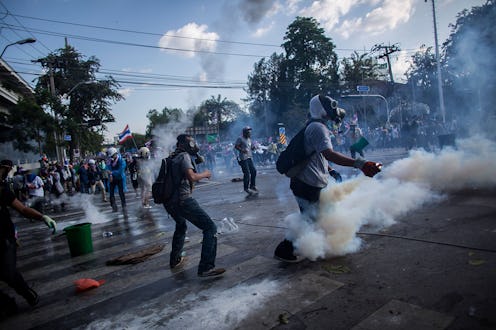News
4 Dead as Thai Anti-Government Protests Escalate
Over a week of anti-government protests in Thailand escalated into violence late Saturday and into Sunday, as groups of protestors clashed with government supporters in the country's capital. Four people were killed and over 60 were injured in the unrest, but demonstrators remain undeterred — tens of thousands congregated at roughly eight sights across the city and stormed Bangkok's television stations to air calls for a general strike Monday.
In a continued effort to topple the government of Prime Minister Yingluck Shinawatra, thousands of protestors took over Bangkok's TV stations Sunday, broadcasting across almost all of Thailand's channels a call to arms by protest leader Suthep Thaugsuban (a former deputy prime minister and legislator for the opposition party).
"To continue the people's operation and to eliminate Thaksin's regime, the People's Democratic Reform Committee would like to announce that Monday 2nd December is a holiday for every government section," Suthep said, urging the government to "think of the country, stop blaming and hurting the people, and return the power to the people."
At least 30,000 demonstrators gathered at eight locations around Bangkok, including the police complex, where Yingluck had been scheduled to give interviews later Sunday. She was quickly forced to evacuate, and her whereabouts are currently unknown.
One group of roughly 1,000 protestors, carrying rocks and petrol bombs, attempted to storm Government House — the government headquarters — but were ultimately stopped by riot police firing tear gas and rubber bullets. "We're all brothers and sisters," one policeman called out, shortly before firing tear gas. "Please don't try to come in!"
"The most violently active area are around the Government House," Lt. Gen. Paradon Pattanathabut confirmed, adding: "We have spread the message to protesters that we are going to retake the government complex and the ministry of finance back."
Late Saturday, a week of generally peaceful protests suddenly turned, when government supporters and anti-government protestors clashed and gunshots were fired — four were killed and at least 60 were wounded in the violence. Since Monday, demonstrators have occupied several government buildings, including the Finance Ministry, and the Department of Special Investigations (essentially the Thai version of the FBI), but the officials have so far been reluctant to respond forcefully to the situation, afraid of repeating the 2010 military crackdown that left over 90 protestors dead.
The protests began as smaller rallies in October, after a political amnesty bill — widely seen as a measure to enable the return of former Prime Minister Thaksin Shinawatra (Yingluck’s brother), who was ousted in a military coup in 2006 — passed the lower houses of Parliament. In spite of the fact that Yingluck easily survived a no-confidence vote in parliament on Thursday and subsequently called on the protestors to negotiate with the government, the demonstrations continue to gather momentum.
